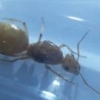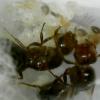If at all possible, I would work on pursuing a PhD as well. This will give you much more flexibility (e.g., you can choose your own research) and you will have many more options for myrmecology careers. In general, salary will be higher as well.
That said, entomology jobs seem to be in short supply these days, regardless of your education level. Looking at it optimistically, I hope this means that there are simply more people interested in the field, but I'm not sure that that is the case.
I was thinking about making a similar suggestion of considering a PhD. You should know that getting a PhD in the US isn't normally a financially rewarding pursuit. It's true that you'd make more starting with a PhD than you might starting with a BS, but if you look at the 5+ years of income and advancement you loose while pursuing the PhD, it can take many years with the higher degree to catch up to where you would have been financially with the BS. Not to detract from the key benefits that Myrmicinae brings up, but it's good to know going into it that if your idea is to maximize your earnings over a period of time, this is most likely not the way to go.
Given all of that, if you more interested in a career that is interesting where you will have more freedom, then a PhD is a very good option. Some general thoughts on going down this route:
You have an idea of what you'd like to study, but truthfully you don't really have the background to make a good decision right now. When I was your age (man that makes me feel old), I really liked chemistry and math. So I thought: I should be a chemical engineer. I turns out I like math a lot more than chemistry. That's OK for me since I was able to move into a more mathematical area in chemical engineering. I did this by working as an undergraduate researcher in a few labs doing different work to see what appealed to me. So one thing to consider: Go to a school with a descent program in what you want to study, and talk to the faculty about the potential to do research in their labs. This will be grunt work but if this is your calling some of that grunt work will be a joy to do. Use this to figure out what you'd like to specialize in for graduate school.
Focusing on a single field may sound fun and I'm sure there are some that will extol the virtue of being a pure scientist or some other silliness. Academic advisors will tell you: Just become a faculty member somewhere. But there are X people every year graduating with the goal of being a PI in a lab some where and there are Y positions available and generally peaking Y is much less than X. So I'd also suggest that being a good scientist is a necessary but not sufficient condition. You need to balance that out with being marketable. I did this by taking the general tools I learned as a chemical engineer to a different field where the applications weren't always evident but useful. How to do this in entomology/myrmecology will be a challenge for you. But thinking about how your education will enable you to get a job is something you should do sooner rather than later.
Scientists working in their individual fields speak their own language. If you go to a conference for any specialized field and just listen to people, the conversations will sound like English, but the word combinations will sound like gibberish. I work with biologists, clinicians, people in business, etc. It doesn't matter if I generate the coolest results in the world. If I cannot communicate those results to people, they might as well not exist at all. So this brings me to a third point: Learn to communicate at a level that most people can understand.
These things will probably be useful to consider regardless of the degree you end up pursuing.
Good Luck.
Edited by john.harrold, September 11 2015 - 2:47 PM.




















